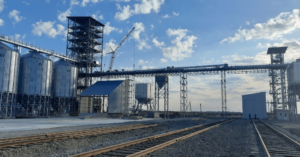
Experts Club hosted a training aimed at psychological rehabilitation of people affected by the consequences of war. This training was part of a larger project organized by the Experts Club in cooperation with the NGO Club of Experts and the ADONIS network of centers. The initiative aims to support and restore the mental health of people who are under stress or have been victims of psychologically traumatic events.
According to Maksym Urakin, founder of the Experts Club, the rehabilitation course will consist of 8 trainings in three stages. The first stage focuses on the diagnosis of stress and post-traumatic conditions using internationally recognized methods, such as the Impact of Traumatic Events Scale (IES-R), the Trauma Screening Questionnaire (TSQ) and others. The next step is art therapy, where participants have the opportunity to work with qualified psychologists, and the final stage is to evaluate the results and develop further recommendations.
“Our goal is to show that recovery is possible, and every affected person can find support and a path to recovery,” – emphasized Maksym Urakin.
Inna Prysyazhna, training leader and psychologist-consultant of the ADONIS medical centers network, emphasized that art therapy uses primarily creative methods, such as painting, sculpture, composing poetry, fairy tales, etc.
“All this is used to express inner feelings and fears. This not only improves mood, but also helps participants find inner harmony and self-confidence. Art therapy does not just treat, but provides tools for self-help and self-realization. It promotes the development of skills that allow you to better cope with everyday challenges,” the psychologist notes.
The project is funded by the Experts Club project’s own funds. In addition, the initiative actively interacts with the media and social networks to raise public awareness of PTSD and the importance of psychological rehabilitation.
“Experts Club is an analytical center with its own video studio and educational center. The art therapy project is implemented in partnership with the Institute of Psychology.

On April 17, 2024, the Embassy of the Argentine Republic in Ukraine organized a tasting of Argentine Malbec wines at Le Silpo in Kyiv on the occasion of World Malbec Day.
The presentation was opened by the Ambassador Extraordinary and Plenipotentiary of the Argentine Republic to Ukraine, Ms. Elena Leticia Teresa Mukusinski.
The history of Malbec is amazing: born in France, it failed to become popular in its homeland and moved to another continent, Argentina, where it finally received well-deserved recognition and universal love.

This grape variety was brought to Argentina in 1853 by the French agronomist Michel Aimé Puget (1821-1875), who was invited to head the agronomic farm in Mendoza by Domingo Faustino Sarmiento, an Argentine politician and future President of the Argentine Republic. The project on their foundation was submitted to the local legislative assembly on April 17, 1853, which became the starting point of Malbec’s new history.

After the cold winter of 1956, when more than 75% of Malbec vines in Europe died, Argentina became the main region where this grape variety is cultivated, and Malbec wine became a kind of visiting card of the country.

In 2011, the Wines of Argentina organization declared April 17 as World Malbec Day to promote Malbec and Argentine wines on the global market.
On January 6, 1992, Ukraine and Argentina established diplomatic relations. The Argentine Embassy in Ukraine was opened in May 1993.
Source: Diplomatic News

The European Investment Bank (EIB), in cooperation with the European Commission (EC), is ready to assist in launching social housing programs, Oksana Remiga, EIB Senior Lending Specialist, said in an interview with Interfax-Ukraine.
The Ministry of Infrastructure and Regional Development is currently engaged in housing policy reform, which aims to harmonize Ukrainian practices with the best European ones. One of the points that is only touched upon in the draft law, but is necessary to harmonize the overall framework, is social and affordable housing; a separate law will be developed in the future.
“The EIB, in cooperation with the European Commission, has pledged to provide assistance to launch this area. We are discussing the possibility of a EUR 200 million targeted loan, which will be supported by a significant investment grant from the EC. Plus a technical assistance package of EUR12 million, which can be used not only to develop technical solutions, implement and monitor them, but also to help develop the regulatory framework,” Remiga said.
She clarified that an active discussion is currently underway between the experts who participated in the development, technical assistance groups, and the future form of this sector.
“Together with the European Commission, we are trying to promote the model that was used in Europe after the Second World War to solve the problem of housing,” she said.
According to her, the model of social housing implies, among other things, that the facilities should be fully owned by the municipality, this sector should be self-sustaining and financially stable.
“What mechanisms can ensure this (financial stability)? One of the simplest ones used in European countries is that in a building under construction, 80% of the premises are allocated for social housing, which is rented by certain socially vulnerable groups at a reduced rent. This housing cannot be bought out. As for the rest of the premises – housing, commercial – it is rented at market rent, which allows to ensure the functioning of the facility,” explained Remiga.
Since it is more difficult to generate income from commercial space in small towns than in large cities, it may be more appropriate for smaller municipalities to establish joint regional offices.
Another key principle of social housing policy is to avoid ghettoization.
“The buildings of such a housing stock should not be located compactly, the buildings should harmoniously fit into the overall urban landscape. It is also important to provide social infrastructure and good transport links,” said Remiga.
At the same time, she noted that the EIB does not consider participation in affordable housing programs, social lease with purchase.
“We are considering programs aimed at creating and improving the quality of social housing packages in municipalities. However, I would like to emphasize that in general, the EIB does not offer programs whose ultimate goal is to provide loans to individuals for housing. Only the creation of housing owned and managed by municipalities,” said Remiga.
The start of the social housing program can be expected no earlier than mid-autumn 2024.
“The European Union and the EIB, which is the bank of the European Union, have a rule: legislative structural changes first. However, due to the extremely critical situation in Ukraine, we are ready to work in parallel. Since we are already working on the regulatory framework, this allows us to launch administrative procedures on our part in parallel. As soon as the (framework) parameters of the future legislation are clear, even before it is adopted and implemented, we can start working on projects,” Remiga summarized.
She added that the upcoming loan program for social housing with a budget of EUR 200 million is a pilot program.
“Given the needs of Ukraine, billions are really needed to solve housing issues. Only after the pilot project is launched and established, when we can see its effectiveness and the ability of municipalities to manage this pool of real estate, can we talk about launching the next stages. We are very interested in this,” said Remiga.

In Ukraine, on Monday night in the northern and most central regions, during the day in Ukraine, except for the northern part and eastern regions, rains, during the day in the south of the country, in some places with thunderstorms, reports the Ukrainian Weather Center.
West, southwest wind, 7-12 m / s, at night in Ukraine, except for the west and south, in some places gusts of 15-20 m / s.
Temperature in the western regions at night will be 1-6 ° C, on the soil surface frosts of 0-3 °, during the day 6-11 ° C; in the rest of the territory at night 3-8 ° C, during the day 10-15 °, in the southeastern part 14-19 °.
In the highlands of the Carpathians, no precipitation at night, sleet during the day; temperature at night and during the day around 0°.
In Kyiv, on April 22, rain at night, no significant precipitation during the day. West wind, 7-12 m/s.
The temperature will be 4-6° Celsius at night and 12-14° Celsius during the day.
According to the Central Geophysical Observatory named after Borys Sreznevsky. On April 22, the highest daytime temperature in Kyiv was 29.0° in 1950, the lowest nighttime temperature was -2.4° in 1886.
On Tuesday, April 23, at night in Ukraine, except for the western regions, there will be light rain, during the day without significant precipitation. Wind of variable directions, 3-5 m / s.
The temperature at night will be 4-9° Celsius, in the western regions 1-6° Celsius, 0-3° frost on the soil surface; during the day 10-15° Celsius, in the central regions up to 19°, in the eastern and southeastern regions 16-21°.
In the highlands of the Carpathians, no precipitation, temperatures at night 0-5° below zero, during the day 0-5° above zero.
In Kyiv, on April 23, light rain at night, no significant precipitation during the day. Wind of variable directions, 3-5 m/s. The temperature at night will be 4-6° C, during the day 12-14°.

The start of construction of the Horonda Platform innovative logistics center in Zakarpattia, a joint project of an Italian consortium led by FS Group (Italian State Railways) and Ukraine’s NSV Group, is scheduled for June 2024, the NSV Group press service told Interfax-Ukraine.
NSV Group Managing Partner Mykola Shapovalov said that following a meeting between NSV Group representatives on April 10 and Italian Business Minister Adolfo Urso, a number of decisions were made that will significantly affect the development of the project. In particular, it was decided to submit an application from NSV Group with the support of FS Group (Italian Railways) in accordance with the law on “investment nannies”. The start date of construction work has been specified – June 2024.
“The land has been formalized and the technical specifications have been obtained. The necessary measures to obtain a permit for “preparatory work” are being finalized, and we expect the start in June. Design surveys are nearing completion,” Shapovalov said.
Among the promising new initiatives discussed during the meeting was the creation of an Italian village next to Horonda Platform.
“We are pleased with the results of the meeting. We are confident that the joint efforts of Ukrainian and Italian partners will contribute to the creation of an innovative logistics center that will become not only a symbol of cooperation between the two countries, but also a crucial factor in the development of both economies. We believe that we will be able to attract even more Italian businessmen to participate in the creation of the industrial park. We are looking forward to the start of construction and are proud to contribute to the development of Ukraine’s logistics sector, and thus to the country’s recovery after the victory,” Shapovalov summarized.
As reported, the Horonda Platform project in the village of Horonda, Mukachevo district, Zakarpattia region, covers 13 hectares of dry port, 35 hectares of industrial park, and a silo with a capacity of 50 thousand tons. At the first stage of the project, two European and two Ukrainian railway lines of 1 km each are planned. It also provides for the possibility of expansion and a significant increase in capacity.

On Saturday, the U.S. House of Representatives (the lower house of the U.S. Congress) supported a bill to provide assistance to Ukraine. There were 311 votes in favor.
Next, the bill will be submitted to the upper house of the U.S. parliament, the Senate.
After that, it will be sent to the US President for signature. Once signed by the president, it will come into force.
The bill approved by the House of Representatives provides for the allocation of almost $61 billion for purposes related to support for Ukraine. Of this amount, $23.2 billion is intended to replenish the US arms stockpile.
Earlier it was reported that US President Joe Biden had a phone conversation with four congressional leaders, during which he emphasized the “urgent need” for the House of Representatives to pass a bill to help Israel and Ukraine.
In February, the Senate approved a $95 billion emergency spending package, including $60 billion to support Ukraine, as well as funds for Israel, Taiwan, and humanitarian aid to Palestinians in the Gaza Strip.
However, Republicans in the House of Representatives called for dividing aid to Israel, Ukraine, and other US allies. On April 1, House Speaker Mike Johnson said that the bill to support Ukraine would include “some important innovations,” possibly providing aid on credit.
April 15 Mike Johnson introduces four separate bills to fund US aid to Ukraine, Israel, Taiwan, and other national security priorities.